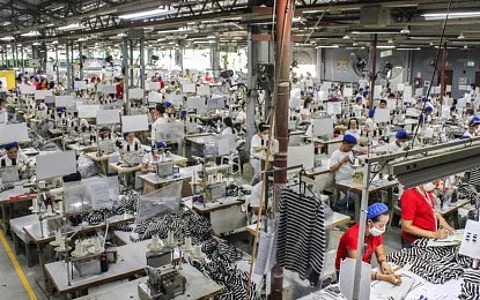
- NEWS
- the EDIT
- COMMENTARY
- BUSINESS
- LIFE
- SHOW
- ACTION
- GLOBAL GOALS
- SNAPS
- DYARYO TIRADA
- MORE

The United States imposing a 17 percent levy on Philippine goods could result in slower overall domestic economic growth, according to an economist.
Michael Ricafort, chief economist at Rizal Commercial Banking Corporation (RCBC), said that because of the tariffs, Philippine exports to the US would become more expensive, which could lead to slower demand for them.
This statement follows US President Donald Trump’s "Liberation Day" tariff announcement on 2 April (US time), which includes a 10 percent baseline tariff on all nations. Under this tariff, 11 ASEAN countries were imposed with tariffs, with Cambodia being the hardest hit at 49 percent, followed by Laos at 48 percent and Vietnam at 46 percent.
Meanwhile, Myanmar had a 44 percent tariff, Thailand 36 percent, Indonesia 32 percent, Brunei and Malaysia 24 percent, followed by the Philippines at 17 percent.
Timor-Leste and Singapore had the lowest tariff imposed at 10 percent.
Ricafort noted that these ASEAN countries, which face higher US import tariffs, could create opportunities “for multinational companies to locate foreign direct investments and production facilities in the Philippines since it has one of the lowest US import tariffs.”
“Provided that the lower tariffs on Philippine imports at 17% would be significant versus the overall cost of production compared to other Asian/ASEAN countries, other ASEAN/Asian countries with higher U.S. import tariffs could look for alternative export markets other than the U.S., such as more exports to the Philippines,” he told DAILY TRIBUNE.
Moreover, the 17 percent tariff could also slow down the following biggest Philippine export items to the US.
Last year, electronic products were the top commodity shipped to the US, accounting for 53 percent of the total share, with the Philippine trade surplus with the US standing at $3.9 billion.
According to the Department of Trade and Industry, certain products are exempted from reciprocal tariffs, including copper ores and concentrates and integrated circuits.
Effect on global trade, local stock market
Furthermore, the economist said the higher US import tariffs on other countries globally and “other protectionist America-first policies” by Trump could weigh on world economic growth, linking to “the retaliatory nature by other countries that would lead to a trade war, slower global trade, investments, employment, and other business/economic activities.”
Likewise, the tariffs are expected to be detrimental to the US, as they pose inflationary risks to the country's economy.
“It may even cause the Fed to completely halt, if not reverse, its policy easing, which in turn could have a ripple effect on other monetary policies across the globe, especially in emerging markets,” said Japhet Tantiango of Philstocks Financial, Inc.
Meanwhile, he said the countries hit with tariffs will see higher export prices, leading to reduced demand from the US. This, in turn, is expected to negatively impact foreign trade, affecting the balance of payments and currency performance.
“If the tariffs result in retaliations, then it would slow down the global economy. Given its negative consequences on the Philippine and global economy, the tariffs are expected to weigh on the local stock market,” Tantiango added.
